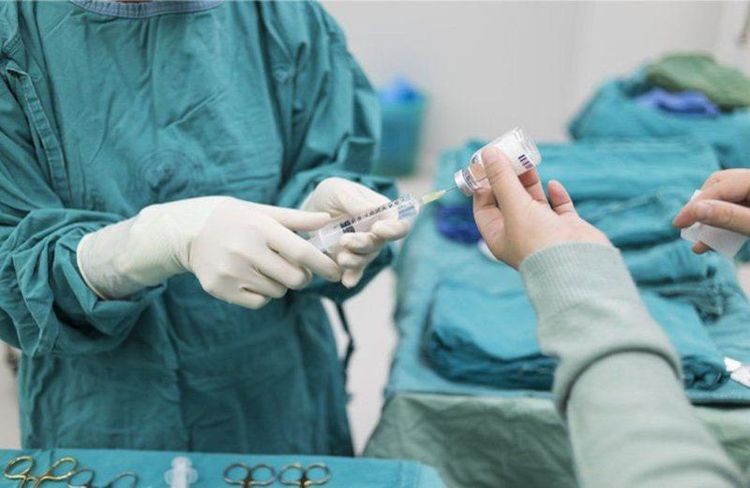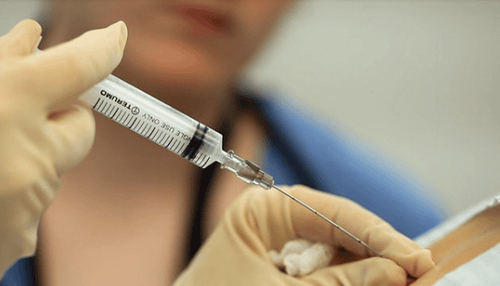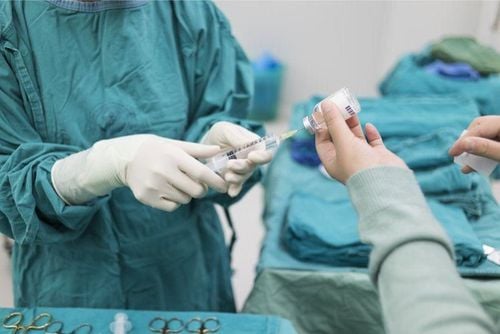This is an automatically translated article.
Posted by Doctor Dinh Van Loc - Department of General Surgery, Vinmec Da Nang International General Hospital
General anesthesia is a controlled state of unconsciousness (loss of consciousness). During general anesthesia, medicine is used to put you to sleep, so you are unaware of the surgery and do not move or feel pain during the operation.
1. What is general anesthesia?
General anesthesia is required for some types of surgery where it may be safer or more comfortable while you are under anesthesia and asleep. General anesthesia is often used for surgeries that take a long time or that will be very painful.
All anesthetics interrupt signal transmission along the nerve. This means that any stimulus to the body is not processed or recognized by the brain.

Gây mê toàn thân giúp phẫu thuật an toàn hơn
2. How are general anesthetics given?
Before having surgery, you will meet with a specialist called an anesthesiologist to discuss which anesthetic is best for you.
Your anesthesiologist will review your medical history and will ask: has anyone in your family had problems with anesthesia. They will also ask about your general health and lifestyle:
Allergies Smoking or drinking Taking any other medications Your anesthesiologist can answer any questions you have. Let them know if you are unsure about any part of the process or if you have any concerns. You should be given clear instructions to follow before surgery, including whether you can eat or drink anything in the hours before surgery.
3. Before and during surgery
Just before you have surgery, you will usually be taken to the operating room where the anesthesiologist will give you a general anesthetic.
Anesthesia will be given as:
A liquid medicine that is injected into your vein through a catheter (a thin plastic tube inserted into a vein, usually on the back of your hand) Gaseous medicine that you inhale in through the mask The anesthetic takes effect very quickly. You will start to feel lightheaded, before passing out within a few minutes or so.
Your anesthesiologist will stay with you throughout the procedure. They will make sure you continue to receive the anesthetic and that you are in a controlled state of unconsciousness. They'll also give you pain medication into your veins, so you're comfortable when you wake up.

Thuốc gây mê có dạng nước và dạng khí
4. Recovery from anesthesia
After your surgery, the anesthesiologist will stop the anesthetic and you will gradually wake up. You usually stay in the recovery room at first before being moved to the ward.
Depending on your circumstances, you will usually need to stay in the hospital for a few hours to a few days after surgery.
General anesthetics can affect your memory, concentration and reflexes for a day or two, so it's important to have an adult with you for at least 24 hours after surgery during surgery, if you are allowed to go home. You will also be advised to avoid driving, drinking and signing any legal documents for 24 to 48 hours.
Vinmec International General Hospital is one of the hospitals that strictly applies safe surgical anesthesia practice standards according to international guidelines. With a team of experienced anesthesiologists and nurses, along with modern equipment such as nerve detectors, ultrasound machines, Karl Storz difficult airway control system, anesthesia monitoring system GE's comprehensive AoA (Adequate of Anesthesia) including monitoring of anesthesia, pain and muscle relaxation will deliver high quality and safety, helping patients to have adequate anesthesia, not awake, no residual relaxant muscle after surgery. Vinmec Health System is also proud to be the first hospital in Vietnam to sign with the World Anesthesiology Association (WFSA) towards the goal of becoming the safest hospital for surgical anesthesia in Southeast Asia.
To register for examination and treatment at Vinmec International General Hospital, you can contact the nationwide Vinmec Health System Hotline, or register online HERE.














